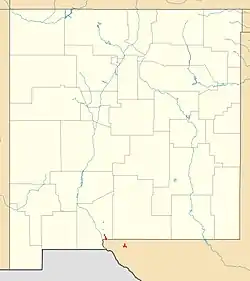La Tuna Formation
The La Tuna Formation is a geologic formation in the Franklin Mountains of southern New Mexico and western Texas and the Hueco Mountains of western Texas. It preserves fossils dating back to the Bashkirian Age of the early Pennsylvanian.[1][2]
| La Tuna Formation Stratigraphic range: Bashkirian | |
|---|---|
| Type | Formation |
| Underlies | Berino Formation |
| Overlies | Rancheria Formation, Helms Formation |
| Thickness | 340–423 ft (104–129 m) |
| Lithology | |
| Primary | Limestone |
| Other | Chert, shale |
| Location | |
| Coordinates | 31°58′0″N 106°31′30″W |
| Region | New Mexico |
| Country | United States |
| Type section | |
| Named for | La Tuna (Anthony, New Mexico) |
| Named by | L.A. Nelson |
| Year defined | 1937 |
 La Tuna Formation (the United States)  La Tuna Formation (New Mexico) | |
Description
The unit consists mostly of massive gray limestone with minor interbedded shale. The limestone is locally cherty[2] and the upper beds include some thin shale lenses and algal mounds.[3] The total thickness is 340–423 ft (104–129 m).[4][1] The formation lies on the Helms Formation[4] or Rancheria Formation[2] and is overlain by the Berino Formation.[4]
The formation contains detrital zircon grains of Cambrian age, which provides supporting evidence for a landmass thought to be present in Pennsylvanian time in the location of the modern Florida Mountains.[5]
Fossils
The formation contains crinoids and other fossils consistent with deposition in the Morrowan (Bashkirian).[1] The upper beds include some algal mounds.[3] The formation contains a diverse gastropod fauna,[6] as well as the foraminiferan Millerella and the demosponge Chaetetes.[7][8] The base of the formation contains earliest Morrowan conodonts.[9] The red alga Masloviporidium delicatum has been reported in the formation.[10]
History of investigation
The unit was designated the La Tuna Member of the Magdalena Group by L.A. Nelson in 1937.[11] In 2001, B. Kues recommended abandoning the Magdalena Group and raising its members, including the La Tuna, to formation rank.[3]
Footnotes
- Harbor 1972
- Kues and Giles 2004
- Kues 2001
- Nelson 1940
- Amato 2019
- Metcalf and Johnson 1971
- West and Kershaw 1991
- Batten 1994
- Lane 1974
- Groves and Mamet 1985
- Nelson 1937
References
- Amato, Jeffrey M. (1 May 2019). "Detrital zircon ages from Proterozoic, Paleozoic, and Cretaceous clastic strata in southern New Mexico, U.S.A.". Rocky Mountain Geology. 54 (1): 19–32. doi:10.24872/rmgjournal.54.1.19.
- Batten, Roger L. (4 April 1995). "Pennsylvanian (Morrowan) Gastropods from the Magdalena Formation of the Hueco Mountains, Texas". American Museum Novitates. 3122. hdl:2246/3564. Retrieved 18 September 2020.
- Groves, J. R.; Mamet, B. L. (1985). "Masloviporidium, a Cosmopolitan Middle Carboniferous Red Alga". Paleoalgology: 85–90. doi:10.1007/978-3-642-70355-3_8. ISBN 978-3-642-70357-7.
- Harbour, R.L. (1972). "Geology of the northern Franklin Mountains, Texas and New Mexico". U.S. Geological Survey Bulletin. 1298. doi:10.3133/b1298.
- Kues, B.S. (2001). "The Pennsylvanian System in New Mexico; Overview with suggestions for revisions of stratigraphic nomenclature" (PDF). New Mexico Geology. 23 (4): 103–122. Retrieved 18 September 2020.
- Kues, B.S.; Giles, K.A. (2004). "The late Paleozoic Ancestral Rocky Mountain system in New Mexico". In Mack, G.H.; Giles, K.A. (eds.). The geology of New Mexico. A geologic history (Special Volume 11). New Mexico Geological Society. pp. 95–136.
- Lane, H.Richard (1974). "Mississippian of Southeastern New Mexico and West Texas--A Wedge-on-Wedge Relation". AAPG Bulletin. 58. doi:10.1306/83D913D0-16C7-11D7-8645000102C1865D.
- Metcalf, Artie L.; Johnson, Walter E. (23 July 1971). "Gastropods of the Franklin Mountains, El Paso County, Texas". The Southwestern Naturalist. 16 (1): 85. doi:10.2307/3670100. JSTOR 3670100.
- Nelson, L.A. (1937). "Gastropoda from the Pennsylvanian (Magdalena) of the Franklin Mountains of west Texas [abstract of thesis]". Colorado University Studies. 25 (1): 89–91.
- Nelson, L.A. (1940). "Paleozoic stratigraphy of the Franklin Mountains, West Texas". American Association of Petroleum Geologists Bulletin. 24 (1): 157–172. doi:10.1306/3D93319A-16B1-11D7-8645000102C1865D.
- West, R. R.; Kershaw, S. (1991). "Chaetetid Habitats". Fossil and Recent Sponges: 445–455. doi:10.1007/978-3-642-75656-6_36. ISBN 978-3-642-75658-0.